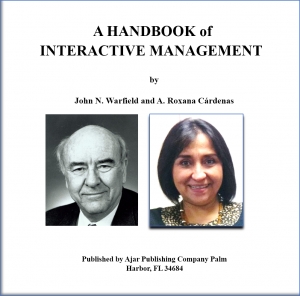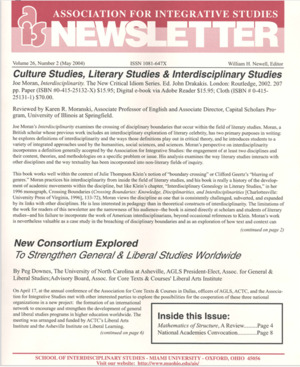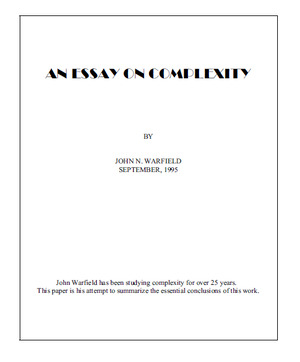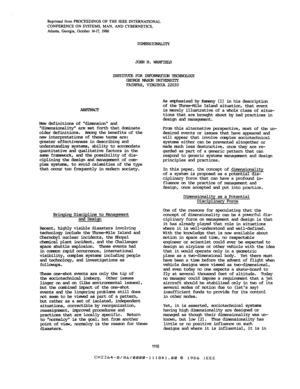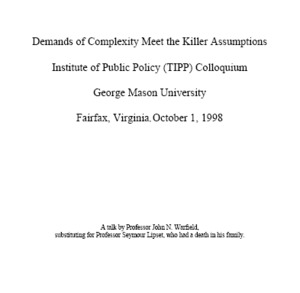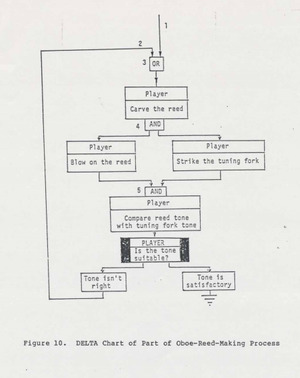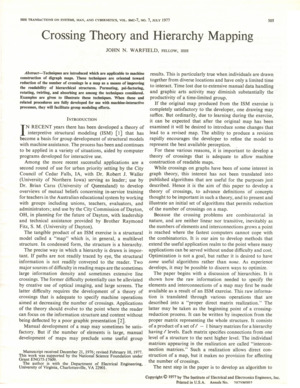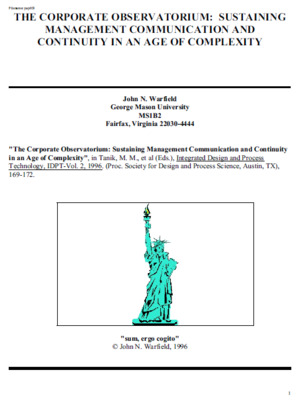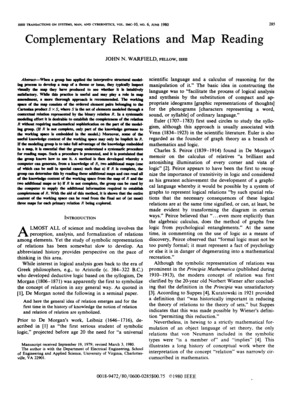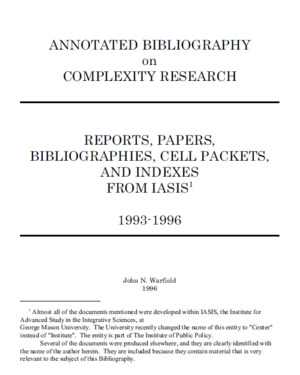Tom Warfield
A Handbook of Interactive Management, 2nd edition
Co-written by John N. Warfield and A. Roxana Cardenas.
A user's guide for clients as well as practitioners, this volume itemizes essential methods and equipment needed to apply Interactive Management in a way that meets the standards envisioned by Warfield when he invented it.
The handbook includes a discussion of software as well as consensus methodologies. This volume contains three indexes and a list of then-current qualified Interactive Management practitioners.
Graph Theory, Mathematical Modeling & Interdisciplinarity: Book Review of The Mathematics of Structure by John N. Warfield
Paul Bugl, a professor of Mathematics at University of Hartford wrote this informative and positive review of Warfield's book The Mathematics of Structure (Palm Harbor, FL: AJAR, 2002).
An Essay on Complexity
A broad summary of Warfield’s “essential conclusions” he has reached during his research on complexity. Provides definition, description, ways of measuring and suggestions for reducing complexity. Is similar to his seminar talk “The Great University.”
Dimensionality (1986)
ABSTRACT: A mathematical basis is presented for possible use in evaluating more accurately the various elements which must be considered in group decision-making. The term, "dimensionality" is given a new meaning describing the limits of inter-relationship between the elements. The triangular "quad" figure is introduced as a method of graphic portrayal of hierarchically related element. Presented at IEEE International Conference on Systems, Man & Cybernetics, 14-17 October 1986, Atlanta, Georgia. See also, “Dimensionality.”
Demands of Complexity Meet the Killer Assumptions: Presentation
States that managers, when confronted with large complex problems (problem situations), must beware that assuming ideas and using methods which work for simpler problems can become a disaster when applied to those problem situations with complex origins, multiple root causes and unquestionably difficult solutions. See also, “Stalking the Killer Assumptions.” Presentation given 1 October 1998 at the Institute of Public Policy (TIPP) Colloquium, George Mason University.
The DELTA chart: A Method for R&D Project Portrayal
A description of a new kind of flow-chart, designed to incorporate not only events and activities but also decision and logic functions. DELTA charts can display a number of different options, as well as `loops' in project plans, at the research and development stage. Slightly modified version of this paper later published in Battelle Monograph No. 1 “A Unified Systems Engineering Concept.”
Crossing Theory and Hierarchy Mapping
Paper contains parts of the theory needed for writing ISM software. Techniques are introduced which are applicable to machine construction of digraph maps. To view the full copyrighted Abstract written in Warfield's own words please use the DOI link given above.
The Corporate Observatorium: Sustaining Management Communication and Continuity in an Age of Complexity
Suggests that the public can learn any sort of complex idea if it is properly illustrated visually, and that Interactive Management's structural models are the best tool for such illustrations. Calls for buildings similar to modern art galleries, with wall displays of ideas rather than pictures. Presented at 2nd World Conf. Integrated Design & Process Technology, Marriott Hotel, Austin, Texas, 1-4 December 1996. See also, The Corporate Observatorium (Abstract).
Complementary Relations and Map Reading
Contains part of the theory needed for writing ISM software. A description of a method for computer-assisted interpretation of graphical structural models, without requiring mathematical sophistication on the part of the working group using the model. To view the full copyrighted Abstract written in Warfield's own words please use the DOI link given above.
Annotated Bibliography on Complexity Research: Reports, Papers, Bibliographies, Cell Packets, and Indexes from IASIS, 1993-1996
Provides titles, authors and detailed abstracts of complexity related writings. Arranged by format, with the categories: Reports, Papers, Bibliographies, Cell Packets and Indexes. Supersedes similar biographies issued in 1994 and 1995.

